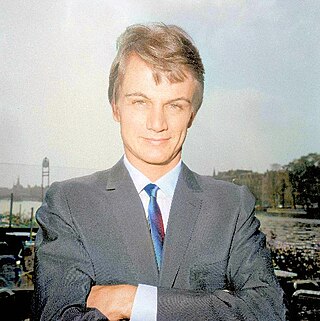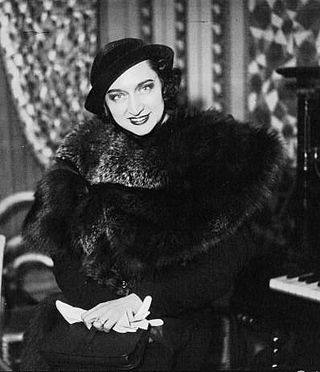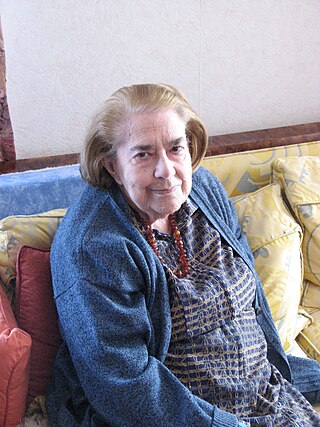Related Research Articles

Édith Piaf was a French singer, lyricist and actress. Noted as France's national chanteuse, she was one of the country's most widely known international stars.

Georges Charles Brassens was a French singer-songwriter and poet.

Claude Antoine Marie François, also known by the nickname Cloclo, was a French pop singer, composer, songwriter, record producer, drummer and dancer. François co-wrote the lyrics of "Comme d'habitude", the original version of "My Way" and composed the music of "Parce que je t'aime mon enfant", the original version of "My Boy". Among his other famous songs are "Le Téléphone Pleure", "Le lundi au soleil", "Magnolias for Ever" and "Alexandrie Alexandra". He also enjoyed considerable success with French-language versions of English-language songs, including "Belles! Belles! Belles!", "Cette année là" and "Je vais à Rio".

Pierre Bachelet was a French singer-songwriter and film score composer. He was also known as Andrew Bascon.

Marie Laforêt was a French singer and actress, particularly well known for her work during the 1960s and 1970s. In 1978, she moved to Geneva, and acquired Swiss citizenship.

Fabienne Thibeault is a French Canadian singer. She is particularly known for her role in Starmania. Thibeault has released numerous albums over her career. She has been the recipient of two Félix Awards.

Jean-Michel Moreau, also called Moreau le Jeune, was a French draughtsman, illustrator and engraver.

Maurice François Alfred Martin van Miële, better known by his pseudonym Martin van Maële, was a French illustrator of early 20th century literature, particularly erotic literature.

Mélanie Hélène Bonis, known as Mel Bonis, was a prolific French late-Romantic composer. She wrote more than 300 pieces, including works for piano solo and four hands, organ pieces, chamber music, mélodies, choral music, a mass, and works for orchestra. She attended the Paris Conservatoire, where her teachers included Cesar Franck, Ernest Guiraud, and Auguste Bazille.
Raymond Asso was a French lyricist.

Les Compagnons de la chanson were a French harmony vocal group, formed in 1946 from an earlier group founded in Lyon, France in 1941. Their best known song was "Les trois cloches" recorded with Edith Piaf in 1946. They were eight or nine members in the group, and they were popular in France with some success internationally, and they continued to perform until 1985.
Hubert Tonka is a French sociologist and urban planner who edited the Utopie magazine, and was one of the leaders of the Utopie movement in the late 1960s and early 1970s.
Sens & Tonka is a French publishing house that was founded in 1994 by Jeanne-Marie Sens and Hubert Tonka. Publications are typically about relatively serious subjects such as architecture, the arts and politics. Authors include Jean-Marie Apostolidès, Miguel Abensour, Marcel Gauchet, Olivier Jacquemond, Mehdi Belhaj Kacem, Sylvère Lotringer, Philippe Di Folco, Günther Anders, Jean Baudrillard, Auguste Blanqui, Pierre Clastres, Gilles Clément, Chloé Delaume, Édouard Dor, Lawrence Ferlinghetti, Olivier Jacquemond, Louis Janover, Franck Laroze, Fréderic Neyrat, Léo Scheer, Paul Virilio...
Henri Betti, born Ange Betti, was a French composer and a pianist.

Yann Benoist is a French session guitarist, performer, singer, composer, conductor, and arranger.
Le soldat rose is a 2006 French-language children's musical with music by Louis Chedid and lyrics by Pierre-Dominique Burgaud. The plot of the musical is about a little boy who hides in the toy section of a department store at night, where the toys come to life.

Lys Gauty was a French cabaret singer and actress. Her most significant work came in the 1930s and 1940s as Gauty appeared in film, and recorded her best-known song, "Le Chaland qui passe", which is an interpretation of an Italian composition.

Jeanne Angèle Desirée Yvonne Joulain was a French organist, concertist and music educator.
Denise Benoît was a French actress and singer, active across a wide range of genres on the stage, radio and television. Other members of her family were musicians.